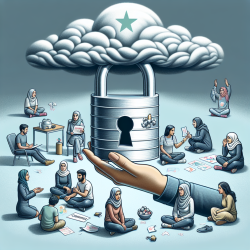Introduction
In a world where over 108 million people have been forcibly displaced, the mental health consequences are significant. Among these displaced populations, a large proportion are young adults who face immense challenges. The recent study titled "Syrian refugee young adults as community mental health workers implementing problem management plus" sheds light on a promising approach to address these challenges.
The Study at a Glance
This pilot randomized controlled trial focuses on Syrian refugee young adults (18-24 years) trained as Community Mental Health Workers (CMHWs) to implement the WHO's Problem Management Plus (PM+). The study aims to assess the impact of this role on their own wellbeing, stress, and coping mechanisms. It also explores the mechanisms that contribute to enhanced wellbeing and reduced stress.
Key Findings
- Enhanced Wellbeing: Young adults serving as CMHWs experienced improved mental health and coping abilities.
- Community Impact: The intervention not only benefited the young adults but also the broader community, fostering a sense of connection and support.
- Mechanisms of Change: The study identified seven key protective factors that contributed to the positive outcomes, including positive emotions, hope, relationships, meaning, accomplishments, autonomy, and engagement.
Implications for Practitioners
For practitioners in the field of speech-language pathology and mental health, this study offers valuable insights into the potential of involving young adults in community mental health initiatives. By engaging young adults in meaningful roles, practitioners can enhance their own skills and contribute to the wellbeing of both the individuals and the community.
Encouraging Further Research
While this study provides a solid foundation, further research is needed to explore the long-term effects and scalability of such interventions. Practitioners are encouraged to delve deeper into the mechanisms of change and explore how similar approaches can be adapted to different contexts and populations.
Conclusion
The engagement of Syrian refugee young adults as CMHWs through the PM+ intervention offers a promising avenue for improving mental health outcomes in humanitarian settings. By focusing on both individual and community wellbeing, this approach not only addresses immediate mental health needs but also empowers young adults to become agents of change.
To read the original research paper, please follow this link: Syrian refugee young adults as community mental health workers implementing problem management plus: Protocol for a pilot randomized controlled trial to measure the mechanisms of effect on their own wellbeing, stress and coping.










